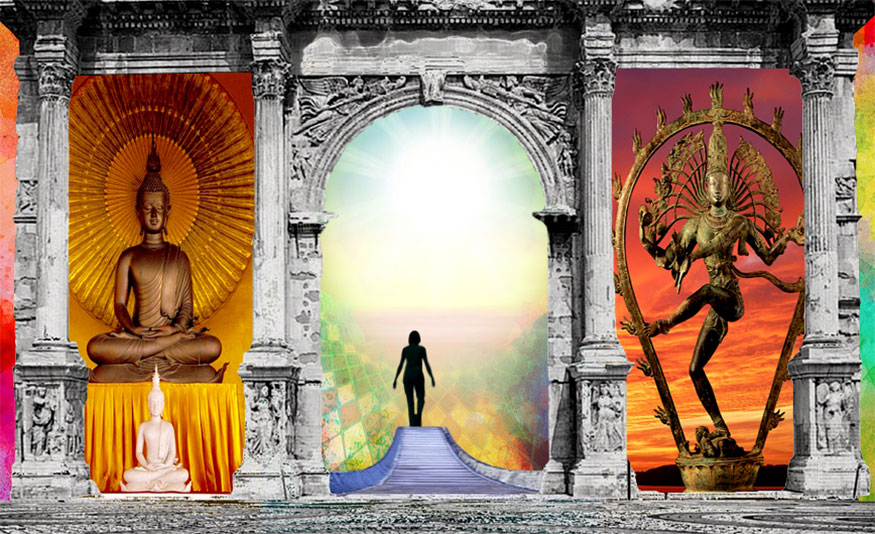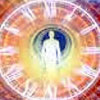Reincarnation And Religious Tradition
 by Gina Cerminara
by Gina Cerminara
For us of the Western world the idea of reincarnation is new and unaccustomed; for the Eastern world it is as old as the rising and setting of the sun, as familiar as the household doorstep.
Two ancient traditions in particular, Hinduism and Buddhism, have taught reincarnation; and there is a great deal that we can learn from both of them. Both Hinduism and Buddhism are founded on the authority of ancient books (those of Hinduism being the much more ancient of the two), and they have been subject to varying interpretations on the part of their own followers. In doctrine and in practice they have been colored by the temperament and history of the peoples who have accepted them. For these reasons we must expect that there will be many differences between the two faiths, even as regards the basic teaching of reincarnation. It is important also for us to recognize that their teachings may not be adaptable, in toto, by ourselves because we have a differing temperament, different historical and religious antecedents, and important new scientific horizons.
A study of the parallels and divergences between Hindusim and Buddhism can be tremendously fascinating. However, we need not concern ourselves with such comparisons here except in one important respect, and that is their differing viewpoints on the nature and ultimate destiny of the soul.
The Hindus conceive of an eternal identity which they call the atman. The atman, they say, persists through a long series of lifetimes; it casts off worn-out garments; and its ultimate destiny is perfection, enlightenment, and joy.
“The truly wise,” Krishna says, in a famous passage in the Bhagavadigita, “mourn neither for the living nor for the dead. There was never a time when I did not exist, nor you, nor any of these kings. Nor is there any future in which we shall cease to be . . . bodies are said to die, but THAT which possesses the body is eternal . . .”
In striking contrast to this view is the view of the Buddhists. The Buddhists maintain that everything in the universe is in a state of change, including our body, our thoughts, and our emotions. What we are pleased to call our soul is merely a conglomeration of habit patterns and I-attachments, also subject to change. So there is really no such thing as a permanent soul, the Buddhists say; there is only an illusory ego which because of its desires and its attachments takes incarnation, yielding place to another ego which in turn takes incarnation, and so on till it is ultimately lost in the whole, without any individuality of its own. The aim of existence is to achieve this liberation and this state of re-absorption.
The Cayce point of view is, in this respect at least, more closely allied to the Hindu than to the Buddhist viewpoint. Cayce, like the Hindus, maintains that there is a permanent identity or self, which transcends and outlives the transient personalities of each successive incarnation. To this eternal identity he gives the name of “entity” or “soul self”.
Moreover our destiny as entities is to become “companions and co-creators with God.” This phrase would seem to indicate that, even though we finally achieve perfection and oneness with God, we also maintain an individuality until the very end of time—or at least until the end of time as we understand it. We become one with the ocean of life, but it is not so much that we are lost in the ocean as that the ocean has entered into us, since we offer no further obstruction to it, “For the heritage of each soul is to know itself to be itself,” Cayce says, “yet one with that Creative Force called God.”
The Cayce point of view here, while different from Christian orthodoxy, nonetheless is much more acceptable than the Buddhistic to people of Christian background. This may be because our Christian tradition unconsciously influences us to be predisposed towards the survival of our individuality. Or it may be because we are temperamentally very much attached to the sense of self-hood. In any case, the Cayce point of view seems more affirmative to us of the Western world, with our active, ambitious temperament, than the Buddhistic, which affects many Westerners as being nihilistic. The idea of an eternal identity give us the reassurance that our strivings and sufferings are not useless and in vain, and it gives us encouragement to continue to pursue all our goals.
But whether we believe in an eternal identity or not, one fact remains—inescapable, undeniable, and pertaining to us all—the fact of human suffering. How are we to escape it? How are we to become free of the frustrations and the agonies that typify human life, and finally live in freedom and joy? What is the way out?
There are various social answers to these questions. There are systems like Technocracy, Socialism, and Communism, which claim to be able to end human misery through more equitable social and economic arrangements. An impartial study of these systems shows that, in theory, each of them do have many merits. Yet even assuming that these systems could do all they claim, and even granting them a maximum length of time for the cumulative psychological effects of universal security and universal education, it is doubtful that they could really fulfill their promise. It is doubtful because human misery is not entirely of a physical nature and universal plenty is therefore not likely to solve the human problem. As long as we have vain, arrogant, lazy, irresponsible, shallow, proud, envious, malicious, gluttonous, intemperate, intolerant, ill-tempered, cruel, vindictive, possessive, power hungry, domineering, stupid, shortsighted, selfish, petty, rapacious, hypocritical, imperfect human beings in this world, we are going to inflict misery upon ourselves and upon each other—regardless of the fact that we might all have two cars and a SUV in the garage, a town and a country home, a deep freeze and a microwave cooker, and all the food we want to eat.
Great religious teachers have always been aware of this psychological fact, and great religious systems have always been at the same time psychological systems. The way out of our misery is, in the last analysis, the way in, to the sources of our misery.
Christ taught this; so did Buddha; so did Krishna. It was the great mission of Edgar Cayce to restate for our age the reincarnation principle which formed the framework for the psychological systems of Buddhism and Hinduism, and at the same time reaffirm, rationally, for a sophisticated generation, Christ’s teachings of what is the way and the truth and the light.
For one thing—and this is what is lacking in Christianity—Cayce considered a knowledge of the laws of reincarnation and karma to be important for our liberation and our salvation: important in the interests of seeing life clearly and seeing it whole, in the interests of knowing the truth that will set us free, and in the interests of having a proper, intelligent perspective upon this brief and often unintelligible lifetime. “One is what one is,” he remarks succinctly in an early reading on reincarnation, “because he was what he was.” “Life in its essence is a spiritual force, and it is continuous,” he says in another early reading on reincarnation. “And it must, for the proper understanding, be interpreted as a continuous experience.”
A passage in the Buddhist scriptures shows us an interesting fragment of conversation between Ananda, one of Buddha’s disciples, and Buddha on the subject of karma. “How deep is this causal law!” Ananda exclaims. “How deep it seems! . . .” And Buddha answered, saying, “Say not so, Ananda, say not so. Deep indeed is this causal law, and deep it appears to be. But it is by not knowing, by not understanding, by not penetrating this doctrine that the world of men has become entangled like a ball of twine, unable to pass beyond the Way of Woe and the ceaseless round of rebirth.”
Cayce, like Buddha, seems completely persuaded of the fact that ignorance of karma and reincarnation can be a hindrance to spiritual progress, and conversely that knowledge of them can be immeasurably helpful.
Not that a noble and beautiful and fruitful life cannot be lived without this knowledge. Countless men and women of many religious faiths have lived great and even saintly lives in complete ignorance of, or disbelief in, reincarnation. And yet it seems likely, to the present writer at least, that at a certain stage of evolution, a knowledge or reincarnation is indispensable for full comprehension of oneself and of life in general. The final redemption of self could hardly be made without a conscious dredging of the past and conscious transmutation of it. Perhaps we have reached the stage of our history where this knowledge is necessary to us—otherwise it would not be appearing in so many places.
At any rate, the fact that Cayce considered this knowledge important is clear by obvious inference: had he not thought so, he obviously would not have, as a therapist, given such information to the troubled people who came to him for help. It is also clear from many direct quotations that he did not consider the knowledge of reincarnation to be important merely as an additional piece of intellectual furniture, or the knowledge of one’s own karma to be worthwhile merely by way of satisfying idle curiosity.
“Just to find out that you lived, died, and were buried under a cherry tree in grandmother’s garden,” he remarked pointedly in a reading given in 1937, “does not make you one whit better as a neighbor, citizen, father, or mother. But to know that you spoke unkindly in the past suffered for it, and in the present may correct it by being kind—that is worthwhile!”
This sensible comment could well be taken to heart by many people who, becoming convinced of the truth of reincarnation, make eager efforts to discover their own past lives.
At the present time there are two major ways of learning about one’s past: (1) reliving or recalling it oneself, through hypnosis, reverie, free association, etc.; or (2) having it told to one by a clairvoyant or a medium. Both these methods have their advantages and disadvantages, their weaknesses and their strengths. There is, of course, the possibility of error in either of them; there is also the possibility of psychological harm, as well as psychological good. The human mind is capable of both fantasy and deception.
But one very important thing to remember in judging the value and authenticity of any presumable past life information—no matter how it is obtained—is this: Are there causal sequences apparent in this data that show me how to correct my past errors in the present, or that give me deeper self-understanding?
The costuming of a past life personality is important, to be sure; a monk’s garb will surely have had a different effect upon its wearer than a jester’s suit, and will signify a different area of experience; but it is the psychology of the personality that is really important. Of what value is it to know that one was a courtesan or a king, a Mississippi river pilot or a peasant in Alsace-Lorraine, a temple dancer in Cambodia or searcher after California gold, unless one also knows the nucleus of character traits that typified that life and that led to the life complications of the present? Almost anyone can think up grand opera plots of love, treachery, murder, revenge, remorse, sudden death, and all the other human vicissitudes, and identify himself as their hero or villain. But this could be no more than an entertaining exercise in fantasy unless there is a psychologically valid relationship shown in terms of moral cause and effect between that past life and the present.
Moreover, none of this is of any real and lasting value unless, in addition to the self-insight gained, there is also the willingness to incorporate the insight into one’s day by day conduct of life. Cayce stressed the conduct of life, in fact, as one major way of freeing oneself from the fetters of karma, past or potential. And this conduct has to do with every department of living: with our ideals, our aims, our thinking, our work, our habits of eating and drinking, our speech, and our treatments of other people. “Not what one was, but what one does about what one knows—that is what is important!” he said, to someone with excessive and apparently idle curiosity about his former selves.
In fact, Cayce went even further than this and maintained that knowledge, of itself, is no use without application. “Knowledge not lived is sin!” he exclaimed, more than once. Knowledge, then, plus the application of knowledge in right conduct, are two important elements in extricating ourselves from the mess we are in. These are of the mind and of the will respectively. We begin to suspect that a third ingredient must be of the soul, or love—and we are right.
Following the emphasis of Christ who said, “These things I command you, that ye love one another,” Cayce insisted that love is of the very essence of our redemption from the snares and delusions and sorrows of this world. When he told people to do something “for the glory of God,” or “in the name of Christ,” or “for the sake of Christ,” or “with the Christ consciousness,” he was using phrases, all of them, indicative of the substitution of the interests of something beyond oneself for one’s own self-interest; they are all “mystical” or symbolical ways of putting the notion that we must rise above animal selfishness into the capacity for impersonal love for all created things.
With our mind we must seek out the laws of life and death; we must acquire knowledge; we must pursue science. Ignorance and blind faith are unworthy of a man. With our will then we must seek to bring ourselves into intelligent harmony with the laws that we have discovered. But with our soul we must also seek to love . . .
If we wish, we can find interesting parallels between these concepts and the concepts of salvation to be found in Hinduism and Buddhism. Love is to be found, of course, both directly and indirectly, in the Hindu and Buddhist scriptures as well as in the Christian. As a matter of fact, love has in some respects been much more practiced in Hindu and Buddhist countries than in Christian. Buddhists have never in their long history been guilty of such Christian atrocities as an Inquisition, a persecution of “witches,” or a religious war; a Society for the Prevention of Cruelty to Animals is unnecessary among the Jains of India, whose ruling principle is ahimsa, harmlessness to all living beings, and whose loving concern for all forms of life, including insects, is extraordinary.
But love as a spiritual force and as a principle of human relations is an inherent and paramount part of the Christian teaching; the paramount teaching of the Sufis, in Islamic countries, is also love; and gradually, as we have come out of our own barbarism, we have been learning to apply it in more and more areas of our social and psychological thinking.
In any case, it is curious thing that if we truly love, we find ourselves ultimately in a very similar attitude of soul as that achieved by Hindus and Buddhists in their strivings for liberation. If we have love, we find that we begin to work in the world just as the dedicated Hindu works: for the sake of the beautiful action, and not for the sake of the personal rewards of action. If we do all things, substituting the thought of selflessness for the thought of our own ego, we will surely lose that illusory set of ego-attachments that fasten us, in Buddhist persuasion, to the Wheel of Woe and the endless round of births and deaths. We can go on indefinitely, drawing parallels (or seeing subtle differences) among the three faiths.
But once our restless, curious mind is satisfied that mutual confirmations are to be found between the liberation techniques of Christianity and of the two great religions of the East, a greater task lies before us: the task of applying any one of these methods today, in our life—and most especially, perhaps, applying love.
There is a story told about St. Francis, that one day when he was hoeing his garden, someone asked him what he would do if he were to be told that the world would end that night. St. Francis thought for a moment, and then replied, quietly, “I would continue to hoe my garden.”
We who live under far more terrible threats of planetary destruction than St. Francis ever dreamed of on the sunny slopes of Italy would do well to ponder his untroubled words. Global wars, hydrogen bombs, natural cataclysms, continental destructions—the mere thought of these things gives many people all over the world a sense of futility and pointlessness in living. But this is not necessary.
No matter what happens in the world outside, I am still custodian, and custodian only of my world inside. My thoughts, my emotions, and my behavior are entirely my province. My reactions to good fortune and ill; to war and peace; to deprivation and abundance; to the married or the unmarried state; to being a man or a woman; successful or unsuccessful; beautiful or ugly; the underdog or the overdog; in a dominant race or an oppressed one; in a weak or a strong body; in an inhibited or an uninhibited personality; all these experiences are opportunities, tests, and the material on which I must work to win my freedom. All of us, no doubt, on our long journey pass through all of these pairs of opposites.
These conditions are our ancestral estates. This is our garden. We must set about ourselves to diligently hoe it.
Excerpt from The World Within
Posted in Other Topics, Reincarnation, Spiritualitywith comments disabled.





